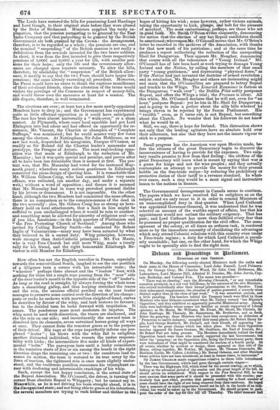The elections are over ; at least but a few
more newly-appointed Members have to drop in; and the Government has experienced quite as little effectual opposition as it could have anticipated. The race has been almost universally a " walk-over," or a sham contest. At Plymouth, where some local squabble had got Lord Ebrington into bad odour and had offered an opportunity for re- sistance, Mr. Vincent, the Chartist or champion of " Complete Suffrage," was nominated; but he could muster very few votes among the electors. At Nottingham, Sir John Hobhouse, as we saw last week, despatched his antagonist, Feargus O'Connor, as readily as Sir Roland did the Chartist leaders namesake and prototype, the Feragus of Ariosto. The most real-looking oppo- sition was that made at Edinburgh to the reelection of Mr. Macaulay; but it was quite special and peculiar, and proves after all to have been less formidable than it seemed at first. The pre- text was, that Mr. Macaulay had voted for the increased May- nooth grant ; wherefore many serious gentlemen in Edinburgh conceived the pious design of ejecting him. It is remarkable that Mr. William Gibson Craig, who had committed the very same offence, was reelected, (on another day, and under a separate writ,) without a word of opposition ; and thence it is assumed that Mr. Macaulay had in some way provoked personal dislike by his letters or demeanour. It is not impossible. On the other hand, although the two Members had committed the same offence, there is no comparison as to the conspicuousness of the deed in the two severally : also, Mr. Gibson Craig has so strong an here- ditary hold on local attachments, that a fault in him might be suffered to pass unchallenged where it would be ruin to another : and something must be allowed for sincerity of religious zeal—or, if you like, fanaticism—in the high quarters of Puritanism and " the Free Protesting Church of Scotland." Among those who invited Sir Culling Eardley Smith—the unelected Sir Robert Inglis of Voluntaryism—many may have been actuated by what they believed to be a sacred duty. Whig principles, however, were stronger than Anti-Catholic principles : Mr. iox Maule, who is very Free Church but still more Whig, made a timely rally for his friend, and the right honourable Edinburgh Re- viewer is still Member for Edinburgh.


























 Previous page
Previous page